#Node js front end
Text
Hire Nodejs developers | Nodejs development services -Chapter247
Hire Nodejs developers with great experience and enhance the growth of your business with dedicated team. Chapter247 offers Nodejs Development Services all over the globe, with decades of experience in Custom Web Development.
#node js developers#hire node js developer#node js development company#node js web development#node js app development#node js development services#nodejs development company#node js web application development#node js development#node js backend#create node app#Node js front end#node js server side#full stack node js#node js web app framework#node web development#nodejs trends#node js mobile app#node js application development#hire node js experts#nodejs mobile#hire nodejs developer nodejsdevelopers#hirenodejsdeveloper#nodejsdevelopmentcompany#nodejswebdevelopment#nodejsappdevelopment#nodejsdevelopmentservices#nodejswebapplicationdevelopment#nodejsdevelopment#nodejsbackend
0 notes
Text
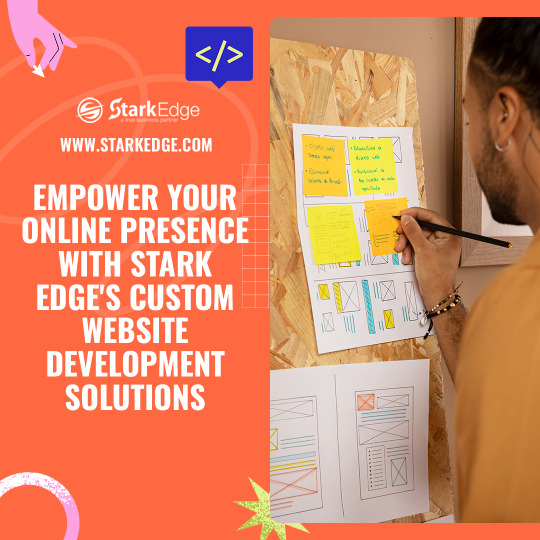
Transform Your Online Presence with Expert Website Development | Stark Edge
Looking to elevate your online presence? Stark Edge offers professional website development services tailored to meet your specific business needs. From sleek designs to seamless functionality, our experts can build a website that captivates your audience and drives tangible results for your business.
#front end developer#website development services#front end development services#hire javascript developer#node js development company#node js development services
0 notes
Text
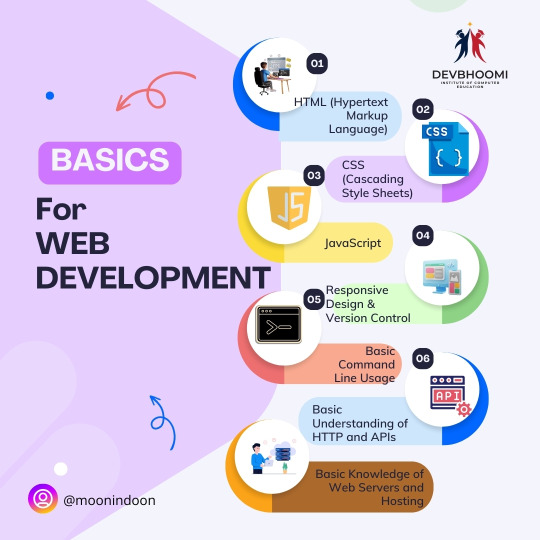
Ready to dive into web development? Here are the fundamental basics you need to kickstart your journey! From HTML and CSS to JavaScript and responsive design, master these essentials to build stunning websites and unlock endless possibilities in the digital world.
#dice#devbhoomi#devbhoomi institute of computer education#computer education#computer science#website development#basics#learn#education#html5#html#css#css3#javascript#js#bootstrap#front end development#front end#design#development#node js
1 note
·
View note
Text
Best 20's Front-end Language for Web Development
In the ever-evolving landscape of web development, choosing the right front-end language is crucial for crafting engaging and dynamic user interfaces. With a myriad of options available, it can be challenging to pinpoint the best tools for the job. In this blog, we’ll explore the 20 best advanced front-end languages that cater to the diverse needs of web developers. Let’s dive into the world of…
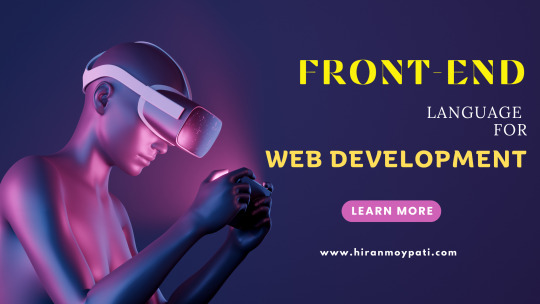
View On WordPress
#Best 20&039;s Front-end Language for Web Development#css#Front-end Project#Front-end Web Development Project#html#node js
0 notes
Text
React Redux Interview Questions
GigaMe provides you the latest and updated technical interview questions and answers. Here, you can learn interview process and how to prepare for coding interview.
For more information, visit our website: https://gigamein.com/
#Node JS Interview Questions#Front End Design#Tech Webinar#Node JS Coding Questions#Javascript Coding Questions
1 note
·
View note
Text

Onisol Systems provide IT training and internship program globally.
#onisol training program#internship training#digital marketing training#technical training#php training#laravel training#node js course#android training#digital marketing course#online digital marketing classes#online internship#online front end training course#online full stack course.
0 notes
Link
Victrix Systems & Labs was born when a group of professionals with a shared passion for solving technology and business challenges came together.
1 note
·
View note
Text
JavaScript Frameworks
Step 1) Polyfill
Most JS frameworks started from a need to create polyfills. A Polyfill is a js script that add features to JavaScript that you expect to be standard across all web browsers. Before the modern era; browsers lacked standardization for many different features between HTML/JS/and CSS (and still do a bit if you're on the bleeding edge of the W3 standards)
Polyfill was how you ensured certain functions were available AND worked the same between browsers.
JQuery is an early Polyfill tool with a lot of extra features added that makes JS quicker and easier to type, and is still in use in most every website to date. This is the core standard of frameworks these days, but many are unhappy with it due to performance reasons AND because plain JS has incorporated many features that were once unique to JQuery.
JQuery still edges out, because of the very small amount of typing used to write a JQuery app vs plain JS; which saves on time and bandwidth for small-scale applications.
Many other frameworks even use JQuery as a base library.
Step 2) Encapsulated DOM
Storing data on an element Node starts becoming an issue when you're dealing with multiple elements simultaneously, and need to store data as close as possible to the DOMNode you just grabbed from your HTML, and probably don't want to have to search for it again.
Encapsulation allows you to store your data in an object right next to your element so they're not so far apart.
HTML added the "data-attributes" feature, but that's more of "loading off the hard drive instead of the Memory" situation, where it's convenient, but slow if you need to do it multiple times.
Encapsulation also allows for promise style coding, and functional coding. I forgot the exact terminology used,but it's where your scripting is designed around calling many different functions back-to-back instead of manipulating variables and doing loops manually.
Step 3) Optimization
Many frameworks do a lot of heavy lifting when it comes to caching frequently used DOM calls, among other data tools, DOM traversal, and provides standardization for commonly used programming patterns so that you don't have to learn a new one Everytime you join a new project. (you will still have to learn a new one if you join a new project.)
These optimizations are to reduce reflowing/redrawing the page, and to reduce the plain JS calls that are performance reductive. A lot of these optimatizations done, however, I would suspect should just be built into the core JS engine.
(Yes I know it's vanilla JS, I don't know why plain is synonymous with Vanilla, but it feels weird to use vanilla instead of plain.)
Step 4) Custom Element and component development
This was a tool to put XML tags or custom HTML tags on Page that used specific rules to create controls that weren't inherent to the HTML standard. It also helped linked multiple input and other data components together so that the data is centrally located and easy to send from page to page or page to server.
Step 5) Back-end development
This actually started with frameworks like PHP, ASP, JSP, and eventually resulted in Node.JS. these were ways to dynamically generate a webpage on the server in order to host it to the user. (I have not seen a truly dynamic webpage to this day, however, and I suspect a lot of the optimization work is actually being lost simply by programmers being over reliant on frameworks doing the work for them. I have made this mistake. That's how I know.)
The backend then becomes disjointed from front-end development because of the multitude of different languages, hence Node.JS. which creates a way to do server-side scripting in the same JavaScript that front-end developers were more familiar with.
React.JS and Angular 2.0 are more of back end frameworks used to generate dynamic web-page without relying on the User environment to perform secure transactions.
Step 6) use "Framework" as a catch-all while meaning none of these;
Polyfill isn't really needed as much anymore unless your target demographic is an impoverished nation using hack-ware and windows 95 PCs. (And even then, they could possible install Linux which can use modern lightweight browsers...)
Encapsulation is still needed, as well as libraries that perform commonly used calculations and tasks, I would argue that libraries aren't going anywhere. I would also argue that some frameworks are just bloat ware.
One Framework I was researching ( I won't name names here) was simply a remapping of commands from a Canvas Context to an encapsulated element, and nothing more. There was literally more comments than code. And by more comments, I mean several pages of documentation per 3 lines of code.
Custom Components go hand in hand with encapsulation, but I suspect that there's a bit more than is necessary with these pieces of frameworks, especially on the front end. Tho... If it saves a lot of repetition, who am I to complain?
Back-end development is where things get hairy, everything communicates through HTTP and on the front end the AJAX interface. On the back end? There's two ways data is given, either through a non-html returning web call, *or* through functions that do a lot of heavy lifting for you already.
Which obfuscates how the data is used.
But I haven't really found a bad use of either method. But again; I suspect many things about performance impacts that I can't prove. Specifically because the tools in use are already widely accepted and used.
But since I'm a lightweight reductionist when it comes to coding. (Except when I'm not because use-cases exist) I can't help but think most every framework work, both front-end and Back-end suffers from a lot of bloat.
And that bloat makes it hard to select which framework would be the match for the project you're working on. And because of that; you could find yourself at the tail end of a development cycle realizing; You're going to have to maintain this as is, in the exact wrong solution that does not fit the scope of the project in anyway.
Well. That's what junior developers are for anyway...
2 notes
·
View notes
Link
3 notes
·
View notes
Text
WordPress VS. Node JS: Which One Is Better?
A content management system (CMS) is WordPress. With so many blogs, content sites, news, and e-commerce sites built on the platform, it is undoubtedly a powerful tool. For developers working on the front and back ends of websites, WordPress shows the most promise.
An open-source, cross-platform JavaScript framework for creating and executing applications is called Node.js. It facilitates code execution and is scalable and lightweight. It employs an event-driven paradigm to make it efficient and make scalable network applications viable.
Key Differences
1. Programming Language
2. Scalability
3. Ease of Use
4. Beginner-friendly
5. Content Creation
6. Libraries and Frameworks
7. Security
In conclusion, WordPress and Node.js will continue to be the most popular web development platforms in 2023. There are excellent options on both platforms. But Node.js, which includes the V8 engine and is cross-platform compatible, is wonderful for creating scalable functions, and WordPress has a great interface.
0 notes
Text
Hire NodeJS Development Services Company in 2022 | Chapter247 Infotech
Chapter247 offers Nodejs Development Services all over the globe, with decades of experience in Nodejs Web Development. Hire Nodejs developers with great experience and enhance the growth of your business with dedicated team.
#node js developers#hire node js developer#node js development company#node js web development#node js app development#node js development services#nodejs development company#node js web application development#node js development#node js backend#create node app#Node js front end#node js server side#full stack node js#node js web app framework#node web development#nodejs trends#node js mobile app#node js application development#hire node js experts#nodejs mobile#hire nodejs developer nodejsdevelopers#hirenodejsdeveloper#nodejsdevelopmentcompany#nodejswebdevelopment#nodejsappdevelopment#nodejsdevelopmentservices#nodejswebapplicationdevelopment#nodejsdevelopment#nodejsbackend
0 notes
Text
Top 10 MERN Stack Development Companies in USA (2024 List)
Introduction: Understanding MERN Stack Development and Its Growing Popularity
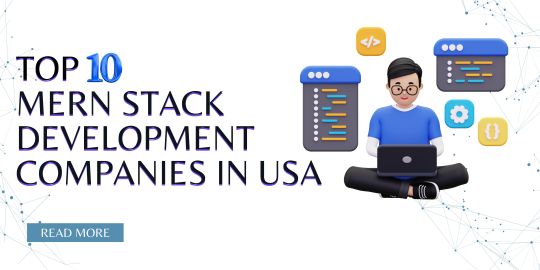
MERN Stack development has become a popular choice for building modern web applications. But what exactly is it, and why is it gaining so much traction? This introduction will provide a foundational understanding of MERN and its rise to prominence.
What is MERN Stack?
MERN is an acronym that stands for four key technologies:
MongoDB: A NoSQL document database that offers flexibility and scalability for data storage.
Express.js: A lightweight Node.js web framework that simplifies backend development.
React.js: A powerful JavaScript library for building dynamic and interactive user interfaces.
Node.js: A JavaScript runtime environment that allows you to run JavaScript code outside of the browser, enabling server-side development.
The beauty of MERN lies in its JavaScript framework-centric approach. By using JavaScript for both front-end and back-end development, MERN offers several advantages:
Faster Development: Developers familiar with JavaScript can quickly learn the entire stack, streamlining the development process.
Improved Code Maintainability: A unified codebase with a single language makes maintenance and debugging easier.
Large Talent Pool: The abundance of JavaScript developers makes finding skilled MERN professionals more accessible.
Why MERN Stack Development is successful in 2024–25:
MERN’s popularity can be attributed to several factors:
Rise of Single-Page Applications (SPAs): React excels at building SPAs, which provide a seamless user experience by minimizing page reloads.
Real-time Features: MERN’s structure is well-suited for building applications with real-time data updates, such as chat apps or social media platforms.
Scalability: MERN applications can be easily scaled to accommodate growing user bases.
Large Community and Resources: The vast MERN community provides extensive documentation, tutorials, and support, making it easier for developers to learn and troubleshoot.
Next Steps:
This introduction has provided a glimpse into the world of MERN Stack development. As you delve deeper, you’ll discover the finer details of each technology and how they work together to create robust and user-friendly web applications.
Top 10 MERN Stack Development Companies in the USA in 2024:
IBR Infotech:
At IBR Infotech, they pioneer innovative MERN (MongoDB, Express.js, React.js, Node.js) stack solutions that empower businesses to thrive in the digital landscape. As a premier MERN stack development company, they specialize in crafting robust, scalable, and feature-rich applications tailored to meet the unique needs of diverse industries. Their team of MERN Stack developers works closely with you throughout the development process, ensuring clear communication and a solution that perfectly aligns with your goals.
2. Concetto Labs:
Concetto Labs, a leading MERN Stack Development Company in India, offers top-notch MERN web application development services. With their skilled MERN developers, they craft bespoke solutions tailored to your business needs. Hire their expert MERN developers to elevate your web presence to new heights.
3. Chapter247:
Chapter247 is a MERN stack development company which creates dynamic web application and digital products with a combination of MongoDB, Express JS, React JS/Redux and Redux and Node JS. They offer custom MERN stack web application development services that streamline your business operations with a great UX.
4. Bytes Technolab :
As a leading MERN Stack development company, Bytes Technolab help global businesses to build innovative web apps with engaging UI that promises customers’ attention. Hire MERN Stack developers who help you build customized software solutions.
5. ThinkSys:
ThinkSys offers a comprehensive suite of MERN stack development services, covering Custom MERN stack application development, MERN stack web development, and Enterprise solutions. They empower businesses to harness the full potential of the MERN stack for unparalleled digital experiences.
6 . Sparx IT :
At Sparx IT Solutions, they have expertise in underlying technologies of MERN Stack that are MongoDB, Express.js, React.js, and NodeJS. They employ the best features of the MERN technology stack to build customized solutions for their clients.
7. Infomaze:
Infomaze helps businesses understand the potential of MERN stack development and how it can benefit their specific projects. This includes a thorough assessment of current technology, identifying pain points and areas for improvement, and developing a roadmap for implementing MERN.
8. CSSChopper
Being a team of skilled MERN developers, CSSChopper uses various methods, like caching and lightweight coding, to develop fast-loading web solutions. This will result in the creation of high-performance web applications.
9. Nextbrain:
At Nextbrain, their professionals have expertise in modern technology stacks of MERN Stack that comprises MongoDB, Express.Js, Node.JS and React. JS. They effectively employ top features of the MERN technology stack to build customized solutions for clients.
10. Webmob Technologies:
Webmob Technologies, is a MERN Stack development company in USA & India, has a team of MERN Stack developers who are highly skilled in their craft and capable of handling complex MERN Stack projects. Hire dedicated MERN Stack developers to form their team for excellent project delivery, short development time, and professionally made applications.
Also Read: Top 10 Laravel Development Companies in the USA in 2024
The Advantages of Partnering with a Leading MERN Stack Development Company
In today’s dynamic digital landscape, building a robust and engaging web application is crucial for business success. The MERN stack, with its power and versatility, has become a popular choice for crafting modern web experiences. But navigating the development process in-house can be challenging. Here’s how collaborating with Mern Stack Development Companies can elevate your next project:
Unparalleled Expertise and Efficiency
Optimizing Costs and Accelerating Time to Market
Building a Secure, Scalable, and Future-Proof Application
Beyond Technical Prowess: A Strategic Partnership
Conclusion-Elevate Your Web Projects with the Expertise of Top Leading MERN Stack Development Companies in the USA!
In conclusion, partnering with top leading MERN stack development companies in the USA can significantly elevate your web projects. Their expertise in MongoDB, Express.js, React.js, and Node.js enables them to create high-quality, scalable, and feature-rich web applications tailored to your needs. By leveraging their knowledge and experience, you can ensure that your projects are developed efficiently, securely, and with a focus on delivering exceptional user experiences. So, if you’re looking to take your web projects to the next level, consider collaborating with top MERN stack development companies in the USA.
#mern stack development#mern stack#MERN stack development companies in the USA#MERN stack development companies#MERN stack development companies in the UK#MERN stack development company#MERN stack development Services
0 notes
Text
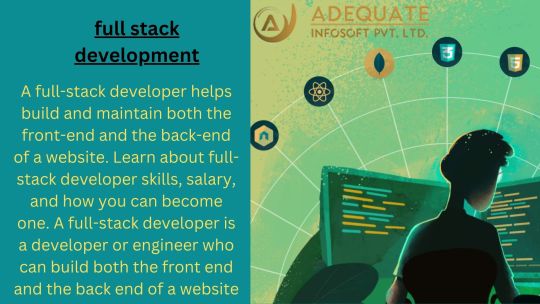
We have full-stack development who can manage the front-end and back-end while working with different front-end technologies such as React JS, Angular JS, Backbone JS, Ember JS, and Polymer JS.Plus databases such as MySQL, NO SQL, MongoDB, PostgreSQL, and Microsoft SQL Server, as well as server-side technologies such as PHP, Ruby On Rails, .NET, Node JS, and Python.
0 notes
Text
Node js Developers: Who are they and Why do you Need Them?
The core concepts of Node.js are innately studied throughout this particular blog along with a practical guidance on how to hire Node.js developers, including crafting job descriptions, conducting interviews, and considering outsourcing versus in-house hiring.
Time and again Node js developers interact with front-end developers in order to blend the server-side logic with the user interface, promising a consistent user experience.
Supercharge Your Web Apps
An event-driven, non-blocking I/O model is put to use by Node js . Meaning that in exchange for holding back for I/O operations to finish before moving on, Node.js can tackle countless requests at once.. This asynchronous nature grants access for highly well planned handling of I/O operations yielding faster response times.
By harnessing the power of Node.js developers, organizations can benefit from efficient backend development, leverage JavaScript across the entire application stack, achieve scalability and performance, and tap into a thriving community and ecosystem.
Node.js developers play a pivotal role in modern web development, bringing with them a unique set of skills and expertise.
Their knowledge of Node.js, coupled with proficiency in JavaScript, allows organizations to build efficient, scalable, and high-performing web applications.
The advantage of using JavaScript throughout the application stack, with the expertise of Node.js developers, promotes code reusability, streamlined development processes, and seamless collaboration between front-end and back-end teams.
Node.js is an open-source JavaScript runtime environment that allows server-side scripting. It is built on the V8 JavaScript engine and enables developers to create high-performing web applications. Node.js is crucial for web development as it provides a scalable and efficient solution, facilitating seamless data-intensive applications and real-time interactions between clients and servers.
Hiring a Node.js Developer can be highly beneficial for your project. Node.js developers can build scalable applications that can handle large amounts of data and traffic efficiently. Their expertise in Node.js and its frameworks enables them to work seamlessly on custom web application development, API development, and real-time web projects.
0 notes
Text
Elevate Your Career with Edchart's Full Stack Development Certificates
Are you prepared to take the ultimate step forward in your profession as a software developer? Edchart, a global leader in online certification companies provides a wide range of full stack development certifications to help you meet your goals. Our certifications aim to demonstrate your proficiency in various technologies and help you excel in the competitive tech sector.
Software & IT Certification: Validate Your Expertise
Software & IT Certification:
Description Edchart's Software & IT certification covers an array of subjects which include software development, cybersecurity, IT infrastructure and much more. You must prepare for the exam to prove your mastery of new technologies.
Web Full Stack Developer Certification: Master Frontend and Backend Technologies
Web Full Stack Developer Certification:
Description: Learn to become a skilled web full stack developer with Edchart's certification. This comprehensive program encompasses front-end technologies like HTML, CSS, and JavaScript as well as backend frameworks like Node.js and Express.js.
Full Stack Developer Certification: Gain End-to-End Development Skills
Full Stack Developer Certification:
Description: Edchart's FullStack Developer Certification prepares you for end-to-end development projects. From defining user interfaces, to maintaining databases. This credential provides you with the necessary skills to tackle all aspects of software development.
MEAN Stack Developer Certification: Dive into Modern JavaScript Technologies
MEAN Stack Developer Certification:
Description: Master the MEAN stack comprising MongoDB, Express.js, Angular and Node.js - with Edchart's certification. Learn how to build easily maintainable and scalable web applications making use of these renowned JavaScript technologies.
Java Full Stack Developer Certification: Harness the Power of Java Technologies
Java Full Stack Developer Certification:
Description: Edchart's Java Full Stack Developer Certification covers both backend and frontend Java technologies. Master the frameworks Spring Boot as well as Hibernate as well as becoming a versatile Java developer within Java ecosystem.
MERN Stack Developer Certification: Build Modern Web Applications
MERN Stack Developer Certification:
Description: Explore the MERN stack - MongoDB, Express.js, React, and Node.js with Edchart's certified. Learn how to create dynamic and interactive web applications with these incredibly powerful JavaScript technologies.
Python Full Stack Developer Certification: Master Python-Based Development
Python Full Stack Developer Certification:
Description: Gain proficiency in Python the full stack of development by obtaining Edchart's certification. In addition to Django and Flask on the backend, and frameworks such as React and Angular on the front end This certification covers everything that is involved in web development using Python.
Full Stack Development Certification: Comprehensive Training for Modern Developers
Full Stack Development Certification:
Description"The Full Stack Certification is your key to successful career in the tech sector. Completely educating you and assessment exercises, this certificate can prepare you for the rigors of today's software development.
JavaScript Framework Certifications: Master the Latest Technologies
Angular JS Certification:
Set yourself up for success with Edchart's AngularJS Certification. Show your expertise with one of the most sought-after JavaScript frameworks, and show off the ability you have to create dynamic web-based applications.
Node JS Certification:
Make yourself a certified Node.js developer by obtaining Edchart's Node JS Certification. Learn to create robust and scalable server-side applications with this extremely powerful JavaScript runtime.
Vue.js Certification:
Master Vue.js, the modern JavaScript framework, paired with Edchart's Vue.js Certification. Get the expertise you need to develop interactive and responsive Web-based user interfaces.
React JS Certification:
Achieve your goals with Edchart's React JS certification. Learn how to create dynamic and interactive user interfaces for web apps by using this library. React JavaScript library.
Express JS Certification:
Verify your knowledge of building web applications using Node.js and Express.js by obtaining Edchart's Express JS certification. Gain recognition for your skills in server-side development.
HTML, CSS, and JavaScript Certifications: Empower Your Front-End Skills
HTML-CSS3-JavaScript Certification:
Edchart's HTMLCSS3 and JavaScript Certification teaches the basic principles of front-end development including HTML marking up, CSS styling as well as JavaScript programming. This certification is perfect for people who are looking to get a complete comprehension of the foundations of web development.
HTML5-CSS3-JavaScript Certification:
Validate your expertise in modern web development technologies with Edchart's HTML5-CSS3-JavaScript Certification. This certification explores advanced concepts like dynamic design, CSS frameworks and JavaScript libraries, and prepares you for the challenges of contemporary web development.
Web Developer Certification:
Make yourself a certified web designer with Edchart's web developer Certification. The course is focused on practical abilities and real-world projects that will allow you to display your abilities to design and construct dynamic websites using HTML, CSS, and JavaScript.
JavaScript Certification:
Get your JavaScript skills with Edchart's JavaScript Certification. From simple syntax and advanced DOM manipulation as well as AJAX techniques This certification equips you with the expertise and experience required to build innovative and responsive web-based applications.
Additional Front-End Certifications
XML Certification:
Master XML, the markup language for structuring and conserving data, is now possible with Edchart's XML certification. Learn how to write well-formed and valid XML documents and leverage XML technologies for data exchange and manipulation.
CSS3 Certification:
Confirm your proficiency in CSS3 the most current version of the Cascading Style sheets language and Edchart's CSS3 Certification. This certification covers advanced CSS techniques, such as animations, transitions and designs that are responsive.
PHP Certifications: Master the Core Language
PHP Certification:
Verify your proficiency in PHP programming language using Edchart's PHP Certification. The certification covers the essentials of PHP syntax, data types and functions and object-oriented principles in programming.
PHP and MySQL Certification:
Build a strong foundation for dynamic web-based applications using Edchart's PHP and MySQL Certification. Learn how to connect PHP alongside MySQL databases to create dynamic databases and websites that use data.
PHP for Developers Certification:
Acquire PHP development expertise with Edchart's PHP - for Developers Certification. This program focuses specifically on advanced PHP techniques, like process management for sessions, handling of form and error handling. This program will assist you in developing robust and secure web applications.
PHP Framework Certifications: Specialize in Popular Frameworks
Laravel Certification:
Master Laravel, the most well-known PHP framework, comes with Edchart's Certification in Laravel. Learn how to speed up your development workflow, implement MVC architecture, and create functional and robust web applications.
CakePHP Certification:
Assess your proficiency in CakePHP framework with Edchart's CakePHP Certification. Improve your skills in rapid application development and harness the advantages of CakePHP's built-in functions to create web applications with ease.
CodeIgniter Certification:
You can become proficient in the CodeIgniter framework with Edchart's CodeIgniter Certification. Learn how CodeIgniter's powerful yet lightweight features to build high-performance web apps.
Symfony PHP Certification:
Learn to demonstrate your proficiency in Symfony PHP framework using Edchart's Symfony PHP Certification. Gain hands-on experience in building Web applications that are enterprise-level using Symfony's powerful components and best practices.
Yii Framework Certification:
You can become a certified Yii Framework developer with Edchart's Yii Framework Certification. Learn how to speed up your development cycle, use security measures, as well as create robust web applications using Yii Framework.
CMS Platform Certifications: Harness the Power of CMS
WordPress Certification:
Learn to master WordPress the world's most popular CMS platform, by obtaining Edchart's WordPress Certification. Learn to create custom themes plug-ins, extensions, and plugins for enhancing the functionality and features of WordPress websites.
Joomla Certification:
Assess your knowledge of Joomla CMS with Edchart's Joomla Certification. Gain proficiency in Joomla's administration and template creation and extension customisation for creating dynamic and feature-rich websites.
Magento Certification:
You can become a certified Magento developer with Edchart's Magento Certification. Learn to harness Magento's strong e-commerce capabilities to create scalable and flexible online stores.
Drupal Certification:
Assess your expertise demonstrate your proficiency Drupal CMS by earning Edchart's Drupal Certification. Learn how to develop and design custom Drupal websites including modules, themes and themes that meet the particular requirements of clients and businesses.
Framework Certifications: Empower Your Development Journey
Web Framework Certification:
Edchart's Web Framework certification is developed to validate your understanding as well as proficiency with various websites development platforms. It covers both back and front-end frameworks. This certification equips you with the expertise needed to excel in current project for web design and development.
Django Certification:
Get your experience verified in Django the high-level Python web framework with Edchart's Django Certification. Learn how to create efficient and maintainable web applications with Django's robust features and best practices.
Ruby on Rails Certification / Ruby on Rails Online Certification:
Acquire proficiency in Ruby on Rails, a well-known MVC framework that allows you to create web applications, using Edchart's Ruby on Rails Certification. You can choose to take traditional class-based learning or online courses that are designed to cater to the style of learning you prefer.
Sencha Framework Certification:
Master Sencha, a leading web application development framework with Edchart's Sencha Framework certification. Learn how to design rich and multi-platform web applications using Sencha's comprehensive suite of libraries and tools.
Front-End Framework Certifications: Stay Ahead in Front-End Development
Front-End Framework Certification:
Edchart's Front End Framework Certification focuses on the most popular front-end frameworks, like AngularJS, Ember.js, and Backbone.js. Acquire skills in front-end development and keep up with the rapidly evolving web development space.
AngularJS Certification:
Accredit your skills in AngularJS as a highly effective front-end framework maintained by Google Edchart with its AngularJS Certification. Learn to create dynamic and interactive web applications by using AngularJS's declarative semantics and its flexible architecture.
Ember.js Certification:
Become a certified Ember.js developer with Edchart's Ember.js Certification. Gain hands-on experience in building powerful web applications with Ember.js's standards and best practices.
Backbone.js Certification:
You can prove your expertise in Backbone.js, a lightweight JavaScript framework, using Edchart's Backbone.js Certification. Learn how to structure your front-end code and effectively manage your application's data by using Backbone.js.
0 notes
Text
Node Js Development India
Node.js allows developers to write server-side applications in JavaScript, a language traditionally associated with client-side scripting. This unification of front-end and back-end development simplifies the development process, enabling developers to work seamlessly across the entire stack.
0 notes